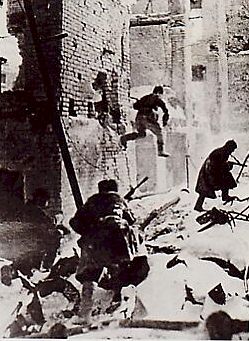In the OP's
linked-to Wikipedia article, I thought some of the post Creasy suggestions interesting. A few were silly, of course. Including the Tet Offensive of 1968, because it turned US public opinion against the war in Vietnam is pretty myopic and could only have been written in the 1970s. History has since quit believing that anything about the Vietnam War was important.
But if you had to boil down Germany's defeat by Russia in the Second World War to any single battle, Stalingrad would seem to be the best choice.
On a larger point, I wonder how relevant it is to dismiss any given battle as "decisive" on the basis that the outcome allegedly decided was "going to happen anyway." The conceit in the question is that battles decide things. I'm not sure that those "decisions" are less so because they confirm rather than reverse a particular tendency in course of history leading up to the said battle.
I'll suggest a trivial example because it deals with Texas and because I just saw a museum exhibit about it last week. One Texas historian in the Wiki article wrote a book called the Battle of San Jacinto the "16th Battle" because it permitted the establishment of the English speaking Republic of Texas and laid the groundwork for the extension of the United States all the way to Alta California.

The obvious counter to including the small scale scrape in what is now the Lynchburg Ferry neighborhood of the Houston Ship Channel is that the United States was probably going to take over Alta California anyway. The Mexican nation was corrupt, almost feudal, and had been engaging in almost nonstop civil war since its founding 15 years before San Jacinto. Despite the natural wealth of Alta California, the upper Pacific coast had remained nearly undeveloped under Spanish and Mexican rule. On the other hand, the American nation was growing, aggressive, and nearly busting at the seams trying to get out into the west and exploit the mineral wealth of the interior and the far west. Some sort of clash was inevitable. And given that, the triumph of the Anglo Americans over the Hispano Americans was all but assured by the politics, economics, and technological disparity of the day.
But given that trend, and that "inevitable" outcome, what then can we say was the decision point, the historical moment at which those historical forces were consumated? Do you deny the conceit and claim that it's wealth, efficiency, and national vigor, not just one hour's clash of arms, that decides history? That seems a waste. If history is decided by economics, then where is the value of the individual? Where is the human drama? Where is the glory in the clash of arms? Why go through the trouble and toil of killing your fellow man in war, or why study those who killed and died, if the matter is really decided by whose factory happens to spit out the sharpest widgets?


